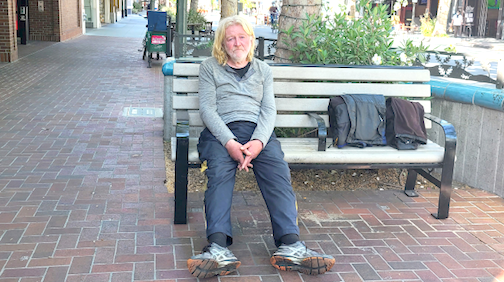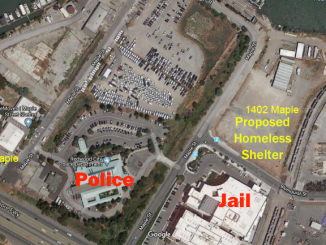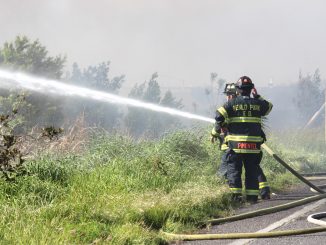
BY KYLE MARTIN
Daily Post Staff Writer
A homeless man who’s lived in Palo Alto for over two decades has been discovered by his brother on the East Coast who thought he was dead.
Gordon Morrison, 66, told the Post on Monday (May 3) that he found his brother Thomas Morrison, 67, in Palo Alto after losing contact with him in 1979. It had been decades since Gordon knew where his brother was, what he was doing, what he looked like or whether he was alive.
Somehow Thomas found his way to the mid-Peninsula, but after all these years, Gordon said how his brother got here is still a mystery. “We were shocked that he was still alive. We thought something happened to him along the way, that he was some sort of John Doe where they found a body somewhere they couldn’t identify,” Gordon said.
The Morrison family first found out Thomas was mentally handicapped when in 1972 Thomas had one of his first severe mental breakdowns during his second year at Boston University during a time when the college sophomore was experimenting with hallucinogenic drugs and hanging out with “the wrong crowd,” Gordon said. Thomas made his first trip of many to a mental hospital and things got worse from there, as he went back and forth from the Dean’s list at Boston and hospitals, Gordon said.
Played a mean guitar
Of the several instances when Thomas was found undergoing a mental breakdown, Gordon recalled when his brother once tried to hand deliver a guitar to the White House during the Nixon administration. Thomas was transported via state troopers between Maryland, Delaware and New Jersey back to the Morrison family home in New Jersey where they lived at the time.
Thomas, who Gordon says once played “a mean guitar,” is the eldest of fourr siblings — Gordon, his brother Donald, who died three years ago at the age of 61, and sister Christina, 60.
The family lost contact with Thomas when he disappeared in 1979. And then Gordon’s mother, Jean Morrison, got a about call two weeks ago from Stanford Hospital telling her Thomas had been found suffering from a mental breakdown, which apparently was the latest of many breakdowns. The news was a welcome surprise to Gordon and his family.
After the call, Gordon on April 26 jumped on a plane to find his long-lost older brother on the other side of the country in Stanford Hospital where Thomas was being treated for his mental disorder, paranoid schizophrenia. The doctors put Thomas on medication, fed him and shaved off his giant white beard, Gordon said. When Gordon got there, he said Thomas recognized who Gordon was, but did not recognize Gordon as his brother.
Thomas told Gordon he didn’t have a brother.
Won’t go to a shelter
After a week in Stanford Hospital, Thomas was discharged and sent back to his home —the streets — where he wished to return. Gordon said he and Thomas’s doctors asked Thomas to move into a shelter, but Thomas expresses adamant refusal to go. And Thomas didn’t want to return to the other side of the country with his brother to live back in North Carolina either, Gordon said.
“He’s happy where he is. He wants to stay where he is,” Gordon said. “He’s getting what I say is decent health care but the quality of life isn’t that great.”And Gordon, though he would have liked to see his brother more regularly again, said “he’s probably been there for a very long time and he’s going to continue to be there for a very long time.”
“He’s happy, and so I’m happy he’s happy,” Gordon said. “He’s still smart in a lot of ways, it’s just reality kind of evades him.”
Thomas sleeps on the streets and lives off the generosity of those in the city, Gordon said. This is partly because Thomas suffers from paranoid schizophrenia and partly because Thomas likes living in Palo Alto. Thomas counts currency in the amount of cigarettes an item might cost, is very particular about where he places his things during the day and sleeps mostly in the same spot. He carries no identification or cell phone, Gordon said.
“He was never aggressive, he never harmed anybody,” Gordon said. “So that was, I guess, a good thing.”
So on April 30, the same day Thomas was discharged from the hospital, Gordon took him back to the corner of University Avenue and Bryant Street in front of the Wells Fargo bank, where Thomas sleeps and hangs out most days. Gordon bought his brother six pairs of socks, four of which Thomas refused to accept, bought him some food and gave him a wallet. And on that same day Gordon got on a plane and returned back home to North Carolina because there was nothing else left he could do.
“All he wants is the clothes on his back and the money in his pockets so he can get some food,” Gordon said.
Help is appreciated
Gordon contacted the Post because he wanted to identify his brother among the unknowns in the city and said that any help the city’s residents have given to his brother is appreciated. Gordon said he doesn’t know how his brother got to Palo Alto, but said Thomas was previously in Denver for several years. And he said after Denver, Thomas has been living in Palo Alto for at least 22 years.
The Post located Thomas on Wednesday at the corner of University Avenue and Bryant Street sitting on a bench, looking in front of him at nothing in particular. Thomas told the Post he enjoys living in Palo Alto and that he will continue to live here. And while he said he knew who Gordon was, he again did not recognize Gordon as his brother — something Gordon said would happen.
Simply put, Gordon said, “he’s a survivor.”
But Thomas’s survival could get more complicated the longer he stays out on the streets because of his health complications — such as his schizophrenia and chronic obstructive pulmonary disease (COPD) that impairs his breathing.
“The bad part about it is the hospital said he was in the hospital about a year ago,” Gordon said. “And because he’s got COPD, they’ve been through this before and it’s very likely that they’ll see more of him as time goes on.”
Lost contact with family
Robert Smith, program manager for Palo Alto’s Hotel de Zink, which is a rotating shelter program that uses local churches to house homeless people, told the Post that it’s common for the homeless to travel throughout California and other states in seek of shelter, food, a job and a cheaper cost of living.
Smith, who regularly helps homeless people through his program run by LifeMoves, a nonprofit organization that helps homeless people find homes, said it’s also common that his clients become estranged from their family. He encounters anywhere from 50 to 80 people daily through his program and at the city’s Opportunity Center, which helps homeless people find food, showers, laundry services and shelters.
He also said he regularly encounters clients who suffer from physical and mental disabilities, adding that the longer they are out on the streets, the worse those problems can get.
Health problems worsen outdoors
“I think any medical condition is definitely increased as far as the symptoms go in an outside environment,” Smith said. “I do feel like if there’s already symptoms there, the environment of being unsheltered definitely adds to it in its own way.”
And he said that solving someone’s homelessness is not a “one-size-fits-all” problem, which adds to the complication of the issue. But, he said, those who do need help can drop in at the Opportunity Center on Monday through Friday between 8 a.m. and 4 p.m. And for those who don’t wish to be moved to a shelter, “if they’re not ready, at least they have the stability of a safe place to be, and they have us.”




This was the shortest “reunited with brother” I have heard of. The headline is wrong in many ways as it leads a false sense of a sad tale changing. Shame on this “brother” for just leaving. There are so many things he could have done. Organizing that a caregiver would attend to his brother on the street would be an example. Someone who would give his vagrant brother some assurance of food, and more comfort daily,
Huh?
Jo complains “The headline is wrong in many ways as it leads a false sense of a sad tale changing.”
How does it do that? It just says “Homeless man is reunited with brother who thought he was dead” — I don’t read anything in there about a “sad tale changing”. It just says that 1. they were reunited and 2. Gordon thought Thomas was dead.
How did you draw that conclusion from the headline?
The church adjacent to Mitchell Park, next to Magical Bridge, is planning to open for overnight homeless camping soon, under the same program mentioned in this article.
I have been helping out Thomas for 5 years as I lived near University. I always thought he was a retired Professor Emeritus from Stanford. Thomas is a gentle soul, except when he needs his coffee: “Would somebody buy me a cup of coffee?!!” I know he is well fed, as I see him eating from Whole Foods bags lots of times. There was also little Zack, who hungout in front of CVS. Do a story on him, if he is still around. Palo Alto’s two homeless (housing challenged?) dudes.
Oh my gosh, we used to live in the area too and my husband always called Tom “the professor”. He thought for sure he’d been one in his former life. And it was Zack who told me his name was Tom. “He’s a cool cat” was what Zack said. We don’t live there anymore but the times we’ve been back I’ve not seen Zack. I did see him at the Fremont BART station once though and chatted with him. He does have local friends, thankfully, who help him out. I bought him a number of meals. Back to Tom, I bought him a number of cups of coffee, especially when he seemed most anxious for one. Medium, black with 2 sugars I believe. And yes, I remember all the Whole Food bags. The community, students included, seem to look after Tom.